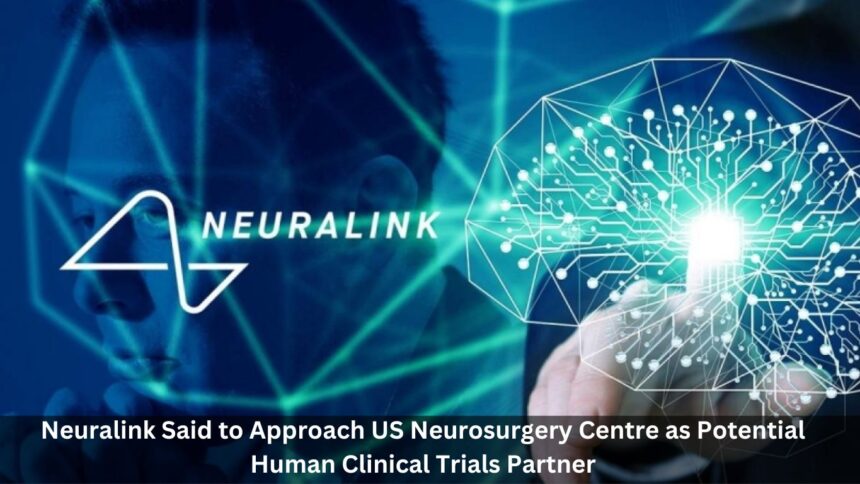Are you ready for the future? Because it looks like the future is already knocking on our door!
Elon Musk’s Neuralink, a company dedicated to developing brain-computer interfaces, has reportedly approached a neurosurgery center in the US as its potential partner for human clinical trials.
This latest development by Neuralink could have incredible implications for the field of neuroscience and beyond.
In this blog post, we’ll explore what this partnership means and how it might change the way we interact with technology forever.
So buckle up and get ready to be amazed!
Neuralink is Reportedly Approaching US Neurosurgery Centre as Potential Human Clinical Trials Partner
Neuralink, the ambitious development project aiming to create a brain-computer interface (BCI) network, is said to be nearing a partnership with a US neurosurgery centre as its first potential human clinical trials partner.
If successful, this would make Neuralink the first company to attempt human clinical trials using BCI technology.
The partnership could see Neurosurgery Centre testing BCI technology on patients with conditions such as brain tumours or spinal cord injuries, in an effort to improve their quality of life.
The aim is for the technology to help these patients regain some level of functionality, and ultimately lead to longer and more fulfilling lives.
Given that Neuralink has yet to achieve any significant milestones in its development cycle, this partnership is an important step forward for the company.
It will provide Neurosurgery Centre with experience and expertise in BCI technology, while Neuralink can draw on the centre’s large patient base and access to world class medical equipment.
Moreover, it could pave the way for future collaborations between both organisations, which would have enormous potential implications for the field of BCI technology.
Neuralink Plans to Develop Brain-Computer Interfaces
Neuralink, a startup developing brain-computer interfaces (BCI), is said to be in talks with a US neurosurgery centre to begin human clinical trials for its technology.
The company has already begun work on an experimental device that can read and interact with brainwaves.
The aim of Neuralink is to create devices that allow people with paralysis or injuries to regain some level of independence.
BCIs are seen as particularly promising for this because they can bypass the damaged areas of the brain.
So far, Neuralink’s device has been tested on rats but the startup is now seeking partners for human trials.
If successful, these could pave the way for more widespread use of BCIs in medical settings.
What is Neuralink?
Neuralink is a startup founded in 2014 by Elon Musk that is focused on creating a neural interface technology.
Neuralink’s stated goal is to create “a brain-computer interface (BCI) that allows people to communicate, control devices, and process information with their thoughts.”
The company has already partnered with some companies to explore the feasibility of human clinical trials using its technology.
In February 2017, Neuralink announced that it had entered into a partnership with US neurosurgery centre California Institute for Telemedicine and Healthcare Research (CITHR) to develop a BCI for surgical procedures.
The aim of the partnership is to create a system in which patients’ brains would be directly connected to machines during surgery, allowing them to regain control over their bodies.
CITHR will provide Neuralink with its expertise in neurosurgery and neuromodulation, while Neuralink will work on developing the software and hardware needed for the BCI.
This agreement is significant because it shows that Neuralink is serious about developing its BCI technology.
It also demonstrates the growing interest in using BCIs as an alternative or supplementary means of surgical communications and control.
If successful, this partnership could pave the way for widespread deployment of Neuralink’s BCI technology in medical settings.
What are the Goals of Neuralink?
Neuralink, a neuroscience startup, said Wednesday it had approached the University of California, San Francisco (UCSF), about collaborating on human clinical trials.
Neuralink said the collaboration would allow UCSF to study how neural implants can be used to treat conditions such as paralysis and memory loss.
In November, Neuralink announced it had raised $100 million in a round of funding led by Obvious Ventures.
The startup has not yet disclosed how it plans to use the money. In February, Neuralink said it had hired Dr. Karl Luks as its chief scientific officer.
What are the Implications of this News for Neurosurgeons?
Neuralink, a startup company founded by Tesla co-founder Elon Musk and Dr. Stephen Mann, aims to create a global network of interconnected computers that can help restore function in people with neurological diseases.
Neuralink’s ultimate goal is to link human brains directly to computer networks, which would allow people with debilitating diseases to regain some level of independence.
Although this project has yet to be fully developed, the potential implications for neurosurgeons are significant.
If Neuralink succeeds in linking human brains directly to computer networks, it could fundamentally change the way we treat neurological diseases.
Neurosurgeons would no longer need to remove large portions of brain tissue in order to provide relief from symptoms they could instead connect small devices directly to the brain.
This would not only improve patient outcomes but also reduce the number of surgical procedures necessary.
If Neuralink is able to successfully bring its technology into clinical trials and prove its safety and efficacy, it could revolutionize the way we treat neurological diseases worldwide.










